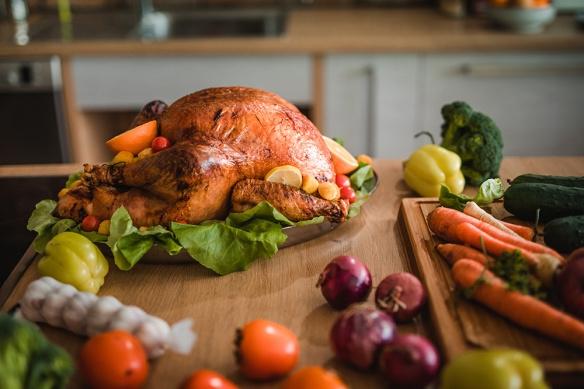Healthy Holiday Eating For Seniors

The holidays are a time for joyous reunions with loved ones, attending parties and celebrations, and partaking of delicious food. For many older adults, staying committed to healthy eating can be a challenge through the special events of the fall and winter.
How can seniors and their caregivers focus on nutritious meals while fully enjoying the holiday season?
Understand What Constitutes Healthy Eating
Before adjusting recipes or bringing specific meals home for the holidays, be sure to have a clear idea of what experts view as healthy foods for seniors.
Based on the current MyPlate for Older Adults nutritional guidelines, colorful vegetables and fruits should fill half of a senior’s plate; berries are an especially healthy choice for protecting the brain. Remember, also, that too much salt is linked to chronic diseases.
Although some seniors have trouble getting enough nutrition, calories do matter for most older adults; as people age, it’s important to get better nutrition from less-caloric foods. Seniors should consume plenty of protein from a variety of sources — including fish, lean meats, dairy products, eggs and nuts — as well as healthy fats. Whole grains and ample fluids also play critical roles in healthy senior eating plans.
Make Adjustments for Changing Taste Buds
For some older adults, getting adequate nutrition can pose problems during the holiday season and throughout the year. As we age, our taste buds change, and the ability to differentiate tastes can decline and lessen the appeal of eating.
For caregivers who must prepare meals for multiple family members, dealing with a senior’s changing tastes — and, in some cases, reluctance to eat at all — can present obstacles to holiday enjoyment.
To tempt senior palates in healthy ways over the holidays, consider reducing sugar and adding sweetness to recipes with natural ingredients like vanilla, nutmeg, cinnamon and citrus. Rather than using salt for flavor, add flavor touches such as vinegars and fresh herbs.
If your loved one suffers from memory problems, consider using a red plate. Research has found that individuals with Alzheimer’s often do not finish their meals, and many lose too much weight. Visual-cognitive problems caused by the disease may be to blame, but the “Red Plate Study” found that when people with Alzheimer’s eat from a red plate, they consume 25 percent more food.
Enjoy Special Treats and Being Together
For many people, the holidays mean eating special food. Creating or purchasing healthy holiday dishes that appeal to senior palates is certainly possible. But remember that the holidays are about much more than dining.
The holiday season also is a time to be with loved ones and to recall cherished family traditions. Using special holiday tableware, for instance, may matter more to a senior loved one than the food that is served. Singing songs that evoke happy memories, telling stories about holidays past, displaying cherished family mementos, and simply spending time together can make the holidays special and meaningful.